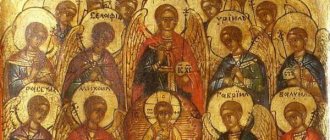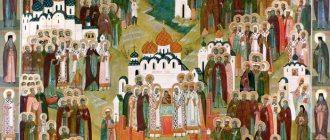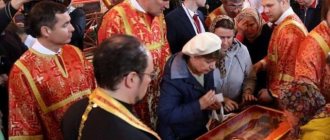For the beginning Christian
Published 03.11.2017
Have you asked yourself the question - why doesn’t God help good people and answer their prayers? Have you ever read the Bible? Let's look at a few stories from the Bible to try to find an answer to this important question.
Example from the Gospel
One answer can be found in the New Testament. The disciple of Christ, the evangelist Matthew, described the case of a Canaanite woman. A pagan woman whose daughter was possessed by a demon came to Jesus. The mother asked for help, but Christ refused her; he said: “I did not come to deal with all people. I was sent only to the lost sheep of the house of Israel.” Despite the outright refusal, the woman continues to bow and call on him. The Lord remains adamant - does not answer, does not give her hope. The intercession of the apostles, who stood up for the poor woman, does not help either. But the desperate mother continues to strenuously ask for the Lord's mercy. Jesus, amazed at the woman’s persistence, says: “How great is your faith! I drive, I push you away, and you believe me? What a beautiful heart! Let it be done according to your will.” And that hour her daughter was healed.
Using the example of this woman, the Lord shows that no matter how sad the situation may be, no matter how it may seem that God is indifferent and does not hear the request, one must not weaken in faith and lose hope. Time spent in prayer teaches patience, humility, and diligence in trusting in God's mercy. The Lord hesitates to answer because He foresees this to be good for man. As soon as people understand and learn this lesson, humble their pride, learn to pray constantly and selflessly, God will respond to their requests.
We want to get everything at once and without difficulty
It is in vain that some believe that God, at their request, will do everything for them himself and that they do not need to make any efforts to achieve what they want. This is not true at all. It is important not to forget the well-known folk wisdom:
Trust in God, but don’t make a mistake yourself.
The Lord will not directly and radically interfere in our lives. He expects us to work, trying to achieve what we want, then God’s participation in our destiny will become clear.
God gives us time to think
Hegumen Nektary (Morozov) instructs: before lamenting that the Lord does not hear us and is unmerciful to us, we need to understand ourselves. Each person should think about whether he is asking for something that will benefit him, will be necessary, will serve for the good, and will not harm other people. Often people ask for something not out of great necessity, but out of passion or foolishness, and at the same time they expect an inevitable and quick fulfillment of their request.
Any passion that a Christian does not want, or cannot yet overcome, stands between him and the Lord and prevents the fulfillment of desires. Spiritual shepherd Nektariy suggests that by postponing the help he is asked for for a while, God gives a person time to think about whether what he is asking for is really vital. In some cases, after mature reflection, people renounced desires dictated by passions. Others independently found a way out of a difficult situation. But it is possible that in any case, conscious prayer plays a decisive role. Although it seems to a person that God left his request unanswered, nevertheless, the Heavenly Father, through prayer, reunites with the Christian and indicates the further path.
Lotusbluete/ Pixabay
Lack of faith and doubts
Another obvious reason why God does not answer our prayers is lack of faith. The Gospel presents many stories of miraculous resurrection, healing, cleansing, casting out demons, etc. Christ called faith an indispensable condition for performing all God's miracles. He said to Jairus, the synagogue priest, who was pleading for the healing of his daughter, who was lying dying:
Do not be afraid, just believe, and you will be saved (Luke 8:50).
Through Jairus' faith, his daughter was raised from the dead and healed.
Faith is the first and important condition that moves a person to prayer. It is not at all necessary to ask for something global. Any prayer request of a true believer will be fulfilled. It is necessary to believe firmly, unconditionally and without any doubt.
With the power of faith and prayer attached to it, miracles are created. Lack of faith does not produce any good fruits. And if a person is also consumed by doubts about the power of prayers, God has no reason to provide him with his miraculous help.
The world's first 3D printed school may appear in Madagascar
Drinking coffee half an hour before exercise speeds up fat burning
“Makeup artist in a hijab”: the most popular bloggers in the East
God knows best what a person needs
Archpriest of the Sergiev Posad deanery Dimitry Bezhenar says that the Lord, as a loving father, knows our own soul, secret desires and aspirations better than we do. He foresees all our needs in advance, but like a wise Father, He also knows what is more useful to us. People often think that they are aware of their needs, and based on them, they make requests to the Lord. But He knows about the urgent need of the human soul, and does not provide help not because He does not want or cannot, He simply knows that it is not useful or even harmful to us.
The highest good for the soul is constant unity with God through prayer. And in order to give us this opportunity, the Lord does not immediately respond to requests, but gives us the opportunity to show humility and submission. At this time, He looks at us with love, but will provide help and give us what we want, exactly at the moment when we really need it. God helps if human strength is lacking. In addition, a person must be prepared for the fact that the request may not be fulfilled in full accordance with his expectations.
Apostasy
Religious experts say the most obvious reason why a person’s prayers remain unheard is apostasy from God. This does not include the position of atheists: an unbeliever will not pray. Sometimes people turn away from the Lord and turn to the devil. At the same time, it is not at all necessary to openly profess Satanism. But recently, various spiritual practices and occultism that have nothing to do with faith have gained incredible popularity. It is not appropriate for an Orthodox Christian to be interested in esotericism, occultism, eastern spiritual practices, magic, extrasensory perception, paganism, etc. Even reading horoscopes is destructive to the soul and therefore forbidden for Christians.
Elizabeth Taylor was married eight times. The reason was her parents
Puff pastries with fish filling, herring roll and cheese baskets with juicy salad
The habit of getting married: Ravshana Kurkova and her 4 spouses
What requests does God leave unanswered?
There are requests that the wise Heavenly Father will not fulfill under any circumstances. The Lord does not answer:
- to selfish, vain requests;
- to prayers that lack love for one’s neighbor;
- on desires that will harm others;
- to a request to be spared from trials;
- to a call to punish someone.
The abbots of the church believe that one cannot ask the Almighty for material benefits, since these requests are offensive to Him. You can ask for spiritual benefits, salvation, deliverance from passions, health, prolongation of life, if His holy will pleases and it is useful for us.
If a person thinks that God does not help him, he thereby expresses distrust in the Lord, in his wisdom and mercy. In the case when people did not get what they wanted, but through prayer they found peace of mind and tranquility, then the appeal to the Lord did not go unanswered.
Prayer for bad things
It happens that people ask the Creator for things that are not just unhelpful, but downright harmful: for punishing offenders, for retribution. Often they try to impose on the Lord the role of some kind of destructive weapon. In such prayers there is no Christian humility and trust in God; the sense of justice that drives them is nothing more than wounded pride. Christ taught to forgive your personal enemies.
Addition
According to my observations, requests reach the Creator much better if they are transmitted through saints. We are all at different levels of vibration, the frequency of which can be higher or lower. The higher a person's frequency, the more likely it is that God will hear the request. The Creator is at a very high frequency.
The frequency of saints is usually between God and man. Saints hear man perfectly, and saints hear God perfectly. The comparison is not entirely successful, but I am trying to convey to you the essence of the frequency difference. There are many facts of saints helping people. If you believe in religions, then help comes from God, thanks to the request of a saint. I also receive help from God more easily when I do it through the saints.
I wish you understanding and awareness of life! Best regards, Lyubomir Borisov. Learn to control your destiny, make your dreams come true and achieve your goals in 30 days.
Prayer against someone else's free will
Under no circumstances should this be done. When a girl or woman asks the Lord to return a departed lover or a husband who has left his family, God refuses, since he is not a matchmaker.
You can't pray:
Lord, he is mine, give him back to me.
It would be more correct to say this:
Lord, give him some sense and help him not to sin anymore.
God will hear such a prayer and answer it.
Saints are not offended
Devotees of piety, lamps of faith, saints of God - this is what we call the saints who have shone in our land and throughout the Christian world. We pray to them, turn to them for help. We are talking about them today in our traditional section. The cleric of the Church in the Name of the Most Merciful Savior, Archpriest Vladimir Goffman, answers readers' questions.
I recently came to faith, began going to church and taking communion. One day, one of my acquaintances (he is of a different faith) remarked: “Here we turn to our God directly, and you, Christians, through intermediaries, your saints.” I told him that it is possible directly, but the saints help, they intercede for us before God. Did I answer correctly?
“We also turn to God directly. Here, for example, are our most frequently used prayers: “Our Father...” or “Lord Jesus Christ, Son of God, have mercy on me.” We can remember many others. But in Christianity, a tradition has developed of turning to saints for help, who have the grace from God to help us sinners. This is also out of humility - how can I, a sinner, turn directly to God? Am I worthy of this treatment? And the saints standing at the Throne of God, who once lived on earth, will understand me and ask the Savior for me. The same applies to the appeal to the Mother of God. Let us open the Gospel: “At the cross of Jesus stood His Mother and His Mother’s sister, Mary of Cleopas, and Mary Magdalene. Jesus, seeing His Mother and the disciple standing there, whom He loved, said to His Mother: Woman! Behold, Your son. Then he says to the disciple: Behold, your Mother! And from that time on this disciple took her to him” (John 19:25-27). With these words, the Savior, as it were, adopts the humanity of His Mother. And we, like children, ask for intercession with her Son, hoping that He will fulfill Her request, as He fulfilled the request at the wedding in Cana of Galilee (John 2:1-11). So the saints to whom we turn with prayers are not intermediaries, they are intercessors for us before Almighty God.
For several years I fervently prayed to one saint. And then he found himself on a pilgrimage trip and there he became acquainted with the life, icons, and, in general, came into contact with the saint, whom he had naturally known and revered before, but did not distinguish from the host of others. And then suddenly he became very close to me. And the one to whom I prayed so fervently before somehow faded into the background. And for some reason I felt guilty! But there is no time or energy to pray to both saints. So I live with some kind of confusion in my heart. Maybe my question is naive, but can the saints be offended by us?
— Your feeling of guilt arose from the fact that we often measure spiritual life by the usual physical yardstick. In the Kingdom of God, it seems, there is no concept of measure and accounting. Our prayer, no matter to whom it is addressed, is heard by both the Lord and His saints, and, if this prayer is sincere and serves the salvation of the soul, they will help us receive what we ask for. The saints are not offended by us. Even during their earthly life they fought and conquered the sin of pride, the result of which is resentment, and with God they are even more pure and holy; earthly feelings are not characteristic of them due to their current situation. Try to approach prayer to the saints more naturally and simply; it does not block Christ, the Mother of God, or other saints from you.
My name is Sofia. My grandmother baptized me in the distant post-war years. I have always considered the martyr Sophia to be my saint and celebrated her name day on September 30th. When I consciously came to faith at the beginning of the new century, I went to the priest and asked if I needed to be baptized again. In the spring I was “completely baptized,” and the woman in the church told me that now my name day is not on Faith, Hope, Love, but on Sofia Slutskaya - April 1, since the memory of this saint is closer to the date of my baptism. But I’m so used to name days on September 30th! And I have kept a small icon of Faith, Hope, Love and their mother Sofia since Soviet times...
— Women in the temple have a lot to say, but not everything should be taken for granted. In prayers for the sacrament of Baptism, a Guardian Angel is asked from God to the person being baptized. As you know, angels do not have names. The heavenly patron whose name a person bears, in your case Sophia, is chosen arbitrarily, according to tradition according to the calendar - close to your birthday. Therefore, I see no reason for you to change your heavenly patron - the holy martyr Sophia, the mother of three young martyrs, named after three Christian virtues - Faith, Hope, Love. “And now these three remain: faith, hope, love” (1 Cor 13:13).
I watched the film “Viking” about Prince Vladimir, the baptist of Rus'. The personality interested me, and I decided to read more about him. And he was surprised how many atrocities he committed before accepting Orthodoxy. Of course, a person can change dramatically, but how can he be called a saint after what he did before?
— First, we are called to trust the Church to which we belong. Moreover, we confirm this by reading the Creed every day: “I believe in the holy, catholic and apostolic Church.” What does it mean? This means that we trust the Church. And she called Prince Vladimir equal to the apostles among the saints. Secondly, no matter what a person is, he has the ability to change. So it was with the persecutor of Christians, the Apostle Paul. So it was with the ardent pagan Prince Vladimir. After baptism he became a completely different person. “And when the visitation of the Most High came upon him, the All-Merciful Eye of the Good God looked upon him, and the thought shone in his heart, that he might understand the vanity of idolatry, and that he might seek the One God, who created everything visible and invisible.” This is what the chronicler says about the prince’s conversion. The Lord prepared for him, as a statesman, not only to turn to God himself (all previously committed sins are washed away in holy baptism), but also to lead Rus' to Christ. This is his great merit. And thirdly, not only the prince, but any person is evaluated in the eyes of God according to the outcome of his life - with what he came to its end. There are many examples in the lives of saints. Some came to holiness from infancy (Rev. Sergius, Seraphim), some from pagan and other errors (Apostle Paul, Prince Vladimir), some from a dissolute life (Rev. Moses Murin, Mary of Egypt). The Lord is waiting for each of us with open arms: “Come to Me, all you who labor and are heavy laden, and I will give you rest” (Matthew 11:28). He can forgive and gives strength to a new life.
How many years after death can a person be glorified as a saint? Are there any rules about this? And by what criteria is it determined that a person is holy?
- Glorification as a saint is called canonization (translated from Greek - “to legitimize”, “to take as a rule”). This is the recognition by the Church of a deceased person as a posthumous saint with appropriate veneration. Of course, God has many more saints than we know. But those who are known, whose spiritual help is experienced by praying people in their lives, are ranked by an act of the highest church authority among the saints of God, among the host of saints. In the first centuries of Christianity, the veneration of saints was determined by the community and legitimized by the bishop. Members of the community venerated their saints, and when veneration took on a church-wide character, it was confirmed by the head of the Local Church. In the Russian Orthodox Church, canonization was performed locally by diocesan bishops. The first example of a conciliar decision on canonization is known in the 16th century. In our time, for local veneration of an ascetic as a saint, the permission of the Patriarch is required, for church-wide recognition of a saint - the decision of the Council of Bishops.
What is required for the canonization of a particular ascetic? Holiness of life, suffering for the Orthodox faith, the gift of miracles, fidelity to the teachings of the Church, incorruptibility of relics, popular veneration. Now materials for canonization in the Russian Orthodox Church are collected by the Synodal Commission for the Canonization of Saints, and each diocese has its own commission to propose the considered materials, approved by the diocesan bishop, to the Synodal Commission. After studying these materials, the commission transfers them to the Holy Synod, and it makes a decision on the canonization of the saint. His name is included in the calendar, after which an icon is painted for the saint and a service is compiled.
In the Orthodox Church there is no set period for canonization, unlike the Catholic Church, where the process of canonization includes two stages - beatification (beatification, as if the lowest level, a kind of verification of all conditions for further canonization) and canonization itself, which represents the final judgment about holiness. The period from the lowest level to the highest can be very long: years, decades, even centuries.
They brought the icon of the Mother of God “The Inexhaustible Chalice” to our church. She needs to pray to those suffering from alcoholism. In front of the icon of St. Nicholas the Wonderworker, they talk about a happy marriage, to St. Sergius of Radonezh - about success in studies. Many similar examples can be given. They even named me a saint to whom I should strictly pray when I have a toothache. Isn’t it possible to pray to St. Sergius for a happy marriage? Why do we have such division?
- Most likely, it was noticed that such and such a saint helps with a certain problem, and another one with another problem. This division is, of course, conditional. We know that the Giver of all good things is the Lord. No matter who we turn to with prayer, it is He who will give help (or not, if it is not saving for a person). According to his spiritual inclination, a person reveres this or that saint, not necessarily even his heavenly patron, and prays to him. There is nothing bad or wrong about this. We just need to remember that God is marvelous in His saints; from Him we expect support, healing from illness, forgiveness of sins, and strengthening in faith. And the saints are an example for us to follow, a certain standard of earthly life, hope for their presence at the Throne of God and help for us sinners. Otherwise, we will become essentially pagans and fall into polytheism. I hope this doesn't happen to you.
Prepared by Nadezhda Muravyova
When quoting, a link (hyperlink) to the website of the Nizhny Novgorod Metropolis is required.











